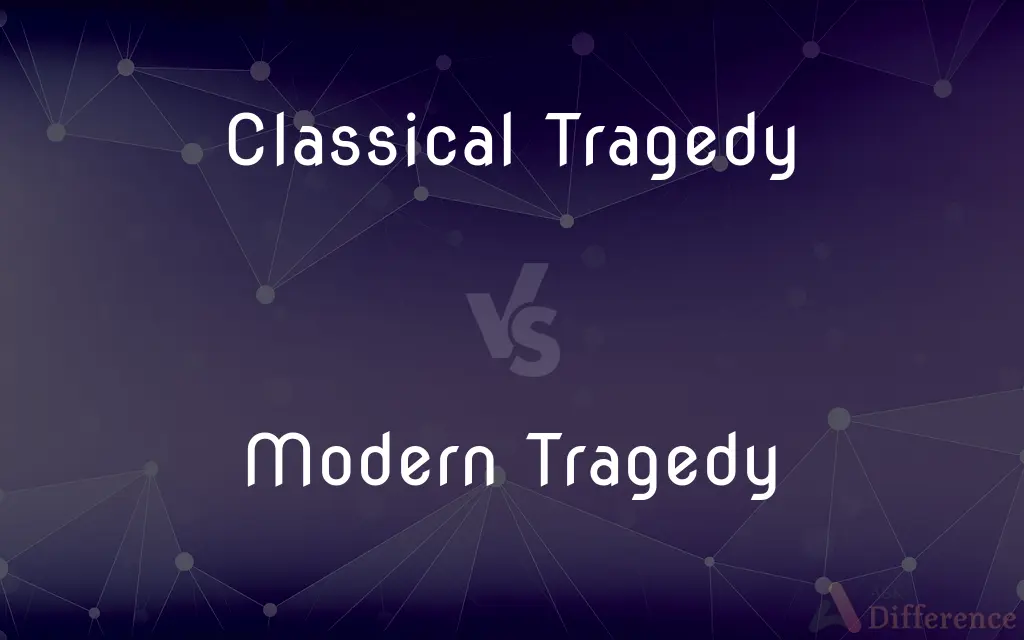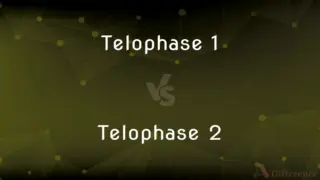Classical Tragedy vs. Modern Tragedy — What's the Difference?
Edited by Tayyaba Rehman — By Fiza Rafique — Published on December 18, 2023
Classical Tragedy stems from ancient Greek drama, emphasizing fate and gods, while Modern Tragedy portrays everyday people confronting societal issues.

Difference Between Classical Tragedy and Modern Tragedy
Table of Contents
ADVERTISEMENT
Key Differences
Classical Tragedy, originating from ancient Greece, has been a cornerstone in the world of drama, laying the foundation for tragic plays. Rooted in the works of playwrights like Sophocles and Euripides, Classical Tragedy revolves around noble protagonists encountering downfall due to fate, flaws, or divine intervention. In contrast, Modern Tragedy, evolving from the late 19th century onwards, shifts the focus from the nobility to ordinary individuals grappling with modern societal concerns and moral dilemmas.
Distinguishing between Classical Tragedy and Modern Tragedy, one observes the pivotal role of gods, fate, and prophecy in the former. Characters in a Classical Tragedy often battle inescapable destinies, foretold prophecies, or the wrath of gods, leading to their tragic end. Modern Tragedy, on the other hand, steers away from such divine elements, portraying characters who face the consequences of their own actions, societal pressures, or the crushing weight of modernity itself.
Another stark difference between Classical Tragedy and Modern Tragedy lies in their settings and characters. While Classical Tragedy portrays kings, queens, and heroes—those of a higher stature—Modern Tragedy brings forth the stories of common people, dealing with relatable issues. Their tragedies aren't brought by the gods but by societal constructs, human psychology, or personal dilemmas.
Furthermore, Classical Tragedy adhered to specific structural norms, including the use of choruses, prologues, and episodic sequences, often with a moral lesson or cathartic effect for the audience. Modern Tragedy, breaking away from these rigid structures, experiments with form, narrative, and dialogue, reflecting the complexities and ambiguities of the modern world.
Lastly, while the purpose of Classical Tragedy was to incite catharsis and uphold societal values, Modern Tragedy tends to challenge, question, or critique societal norms, sometimes leaving audiences without resolution, reflecting the uncertainties of contemporary life.
ADVERTISEMENT
Comparison Chart
Origin
Ancient Greece
Late 19th century onwards
Characters
Nobility (kings, queens, heroes)
Common people
Central Themes
Fate, gods, prophecy
Societal issues, moral dilemmas, human psyche
Structure
Defined (choruses, prologues, episodes)
Experimental, often without clear resolution
Purpose
Catharsis, moral lessons
Question or critique societal norms
Compare with Definitions
Classical Tragedy
Defined structures, like choruses and prologues, are features of Classical Tragedy.
The chorus in Classical Tragedy often offers insight or commentary on the unfolding events.
Modern Tragedy
The protagonists of Modern Tragedy are common individuals, not nobility.
Willy Loman, a struggling salesman, epitomizes the everyday man in Modern Tragedy.
Classical Tragedy
Classical Tragedy aims to evoke catharsis in its audience.
Watching the tragic fall of a hero in a Classical Tragedy can lead to a cathartic emotional release.
Modern Tragedy
Modern Tragedy may not always offer a clear resolution or moral lesson.
Endings in Modern Tragedy can sometimes leave audiences pondering and reflecting.
Classical Tragedy
Classical Tragedy is a form of drama rooted in ancient Greek literature.
Oedipus Rex by Sophocles is a quintessential example of Classical Tragedy.
Modern Tragedy
Modern Tragedy often critiques or questions societal constructs.
Modern Tragedies highlight the often-conflicting nature of personal desires and societal expectations.
Classical Tragedy
The protagonists in Classical Tragedy are of noble or royal stature.
Antigone, a princess in Sophocles' play, embodies the nobility often seen in Classical Tragedy.
Modern Tragedy
Modern Tragedy experiments with form, dialogue, and narrative structure.
Samuel Beckett's Waiting for Godot defies traditional structures, showcasing the flexibility of Modern Tragedy.
Classical Tragedy
Classical Tragedy often revolves around inescapable fate or divine intervention.
In many Classical Tragedies, characters try to escape their prophesied doom.
Modern Tragedy
Modern Tragedy deals with the challenges and dilemmas of everyday life.
Arthur Miller's Death of a Salesman captures the essence of Modern Tragedy.
Common Curiosities
What's the primary origin of Classical Tragedy?
Classical Tragedy originated in ancient Greece.
Are gods and prophecies common themes in Modern Tragedy?
No, while these are central in Classical Tragedy, Modern Tragedy often revolves around societal issues and personal dilemmas.
How does Modern Tragedy differ in its portrayal of characters?
Unlike Classical Tragedy's nobility, Modern Tragedy focuses on common, everyday individuals.
Were choruses a common feature in Classical Tragedy?
Yes, choruses were integral to the structure of Classical Tragedy, offering commentary and insight.
Do Modern Tragedies always have a clear moral lesson?
No, Modern Tragedies might challenge or question norms without providing clear resolutions.
Can Modern Tragedy be ambiguous in its endings?
Yes, Modern Tragedy can leave audiences with open or ambiguous conclusions.
How do the structures of the two tragedies differ?
Classical Tragedy has defined structures like choruses, while Modern Tragedy is more experimental.
Is catharsis a goal of both Classical and Modern Tragedy?
While catharsis is central to Classical Tragedy, Modern Tragedy might not always aim for this emotional release.
Did Classical Tragedies always involve royal or noble characters?
Typically, yes. Classical Tragedies often revolved around characters of high stature.
Are both forms of tragedy still prevalent today?
While Classical Tragedy is mostly studied as historical literature, Modern Tragedy continues to evolve and adapt.
Was fate an overriding theme in Classical Tragedy?
Yes, the inescapable nature of fate was a central theme in many Classical Tragedies.
Does Modern Tragedy challenge societal norms?
Yes, Modern Tragedy often critiques or questions societal constructs and values.
Who are some notable playwrights of Modern Tragedy?
Playwrights like Arthur Miller and Tennessee Williams have made significant contributions to Modern Tragedy.
How has Modern Tragedy evolved over time?
Modern Tragedy has adapted to reflect contemporary issues, shifting societal values, and evolving theatrical forms.
Were Classical Tragedies often performed in festivals?
Yes, they were central to events like the Dionysia festival in ancient Athens.
Share Your Discovery

Previous Comparison
Telophase 1 vs. Telophase 2
Next Comparison
Tides vs. WavesAuthor Spotlight
Written by
Fiza RafiqueFiza Rafique is a skilled content writer at AskDifference.com, where she meticulously refines and enhances written pieces. Drawing from her vast editorial expertise, Fiza ensures clarity, accuracy, and precision in every article. Passionate about language, she continually seeks to elevate the quality of content for readers worldwide.
Edited by
Tayyaba RehmanTayyaba Rehman is a distinguished writer, currently serving as a primary contributor to askdifference.com. As a researcher in semantics and etymology, Tayyaba's passion for the complexity of languages and their distinctions has found a perfect home on the platform. Tayyaba delves into the intricacies of language, distinguishing between commonly confused words and phrases, thereby providing clarity for readers worldwide.
















































